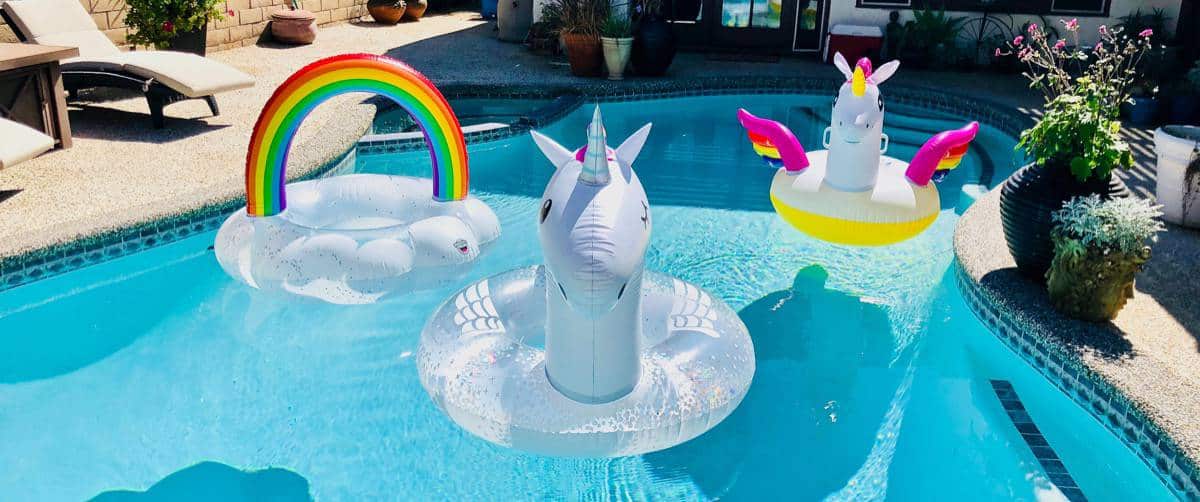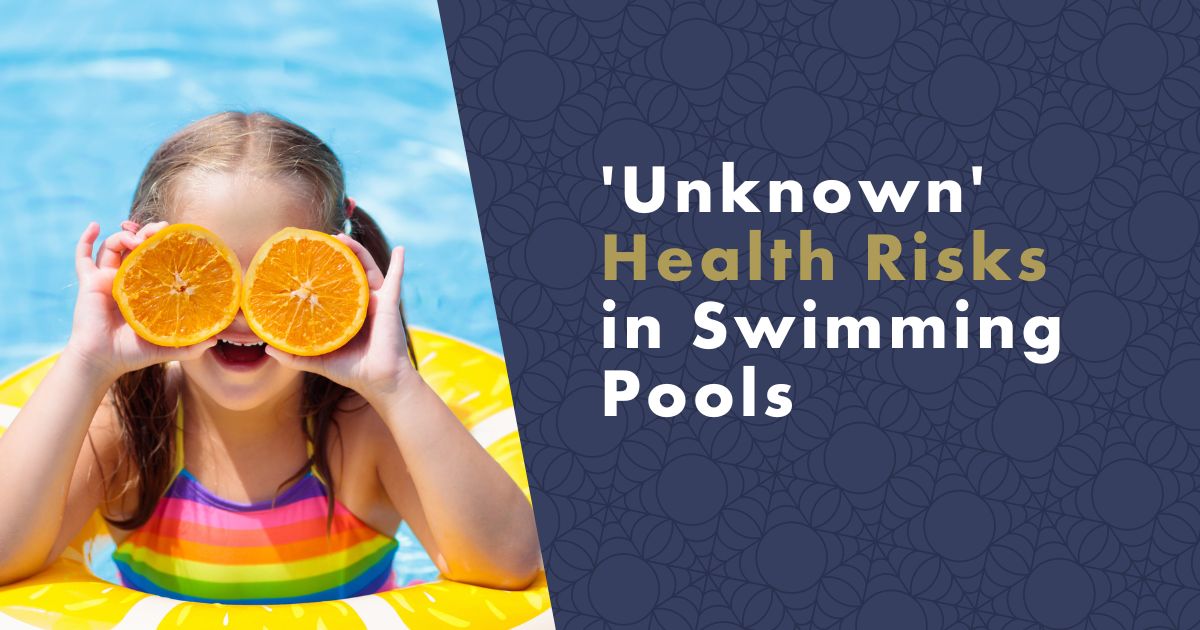Eliminate Health-Threatening Substances: Discover the Power of Modern Water Treatment
Until recently, the challenge of eliminating health-threatening substances from water seemed insurmountable. However, thanks to the remarkable advancements in technology, we now have a solution. Introducing modern UVM medium pressure lamps that effectively eradicate harmful trichloramine, parasites, algae, and other germs, allowing you to enjoy water that rivals the quality found in Olympic swimming pools.
Let's delve deeper into the health risks associated with pools that rely on standard water treatment methods.
The Root of the Problem: Pollution
No matter how diligent you are in maintaining a clean pool, various forms of debris find their way in, be it from poolsides, hot tubs, or even natural bodies of water. While you may cover your pool diligently, the moment you jump in, a significant amount of substances that jeopardize water quality enter the pool alongside you.
You may think, "But we always shower thoroughly before entering the water, so this doesn't concern us." However, only part of the equation is right.
Despite your efforts to eliminate visible dirt under the shower, microparticles of skin, hair, sweat, sebaceous and mucous secretions, bacteria, viruses, fungi, yeast, and residues of cosmetic products and sunscreens are still released into the pool from your body. These substances not only degrade water quality but also pave the way for additional issues.
Read also: How to Clean a Pool Without Chemicals
Trichloramine: The Unseen Threat
When chlorine reacts with impurities, it generates a cocktail of chemicals—several hundred, in fact. Paradoxically, the process of chlorinating the pool inadvertently creates serious problems. Among the compounds formed, trichloramine (bound chlorine) emerges as the most hazardous to human health.
Stay tuned as we delve deeper into the repercussions of these health risks and explore the innovative solutions that guarantee safer and healthier pool experiences for all.

Because trichloramine is not soluble in water, this harmful substance is continuously released from the water surface into the air directly under your nose, from where it easily enters your body.
Did you know that trichloramine, a harmful substance, continuously escapes from the water surface into the air? This insidious compound easily enters your body, posing a range of health risks:
- Acute conjunctival irritation
- Coughing and breathing difficulties
- Irritation and disruption of the upper respiratory tract epithelium
- Development of asthma and allergies
- Allergic reactions in sensitive individuals
- Skin irritation and dryness
That distinct "chlorine" smell near your pool? It's a telltale sign of trichloramine, which jeopardizes your well-being. Learn more about trichloramine in our comprehensive article.
Saltwater Pools: Dispelling the Myth
Even in saltwater pools, trichloramine can form. The chlorine necessary for its production is generated through the electrolysis of dissolved salt (NaCl). It's time to debunk the myth that trichloramine is absent in saltwater pools, which stems from a lack of chemical education.
Parasites: The Invisible Intruders
Don't be fooled by crystal clear water—parasites can still lurk within. While many assume parasites are exclusive to natural swimming pools, documented cases prove otherwise. Some parasites, such as Cryptosporidium parvum and Giardia lamblia, are resistant to conventional disinfection methods. Beware of the symptoms they can cause:
- Severe diarrhea
- Vomiting
- Mild fever
- Abdominal cramps
- Headaches
- Loss of appetite
- Fatigue
While the illness may last up to two weeks for healthy individuals, it poses a potentially fatal risk for children and those with weakened immune systems.
Algae: A Green Catastrophe
Nothing spoils the joy of swimming like overgrown algae. Even with diligent pool cleaning, algae can rapidly degrade your water quality, turning it into unsightly green sludge.

While addressing the aesthetic concerns of pool owners, the real danger lies in the toxic substances released by overgrown algae into the surrounding environment. Cyanotoxins, produced by cyanobacteria found in algae, can lead to symptoms such as nausea, headaches, and allergic reactions. In extreme cases, these toxins have been known to cause damage to vital organs like the liver, kidneys, heart, lungs, and nervous system. Clearly, the impact of algae should never be underestimated.
However, there is a straightforward equation at play. Higher chlorine concentrations in the water result in reduced algae growth. But relying solely on high chlorine levels is not an ideal solution from a health perspective. To ensure water safety, it is crucial to choose an appropriate technology for pool water treatment.
Discover the Solution: Chlorine-Free Water Maintenance
Pool chemistry and traditional filtration systems alone often fall short in achieving perfectly clean and healthy water. That's why public swimming pools, wellness centers, and pool owners are turning to modern medium-pressure UVM (Ultraviolet Medium-Pressure) systems for water treatment. These systems work wonders, eliminating toxic trichloramine from the water and effectively combating resistant parasites. Their effectiveness is even confirmed by the German standard DIN 19643.
Now, you too can bring this revolutionary technology of healthy water purification to your private pool. LIFETECH introduces the affordable ProfiPure UVM lamp, transforming your swimming pool into a haven of purity, wellness, and perfect relaxation.
Experience the difference and embrace a new standard of water quality with ProfiPure UVM lamps, available at nanoSPACE Enjoy the benefits of chlorine-free water maintenance based on advanced nanotechnology. Your health and rejuvenation deserve nothing less.
How to Choose the Best Solution
The ProfiPure UVM goes beyond conventional water disinfection. With its unparalleled ability to reliably destroy bacteria, viruses, microorganisms, and other germs, it creates a permanent and safe water disinfection solution. Bid farewell to worries about waterborne contaminants, as this exceptional UV lamp ensures your pool water remains pristine and hygienic throughout the swimming season. Not only does it excel in disinfection, but it also tackles the removal of harmful trichloramines, a notorious component of bound chlorine. Confirmed by the esteemed German standard (DIN 19643), the ProfiPure UVM guarantees uncompromising water quality.
Among the lineup, the LifeOX Spark 60 stands tall, utilizing a dual technology approach for water sterilization. With its powerful UVC technology, it effortlessly disinfects the water, while the innovative AOP system actively eliminates harmful trichloramines and organic impurities. Say goodbye to green water and unwelcome odors as this remarkable lamp permanently removes all algae, bacteria, cysts, and viruses. Capable of cleaning water volumes up to 60 m³ with an impressive flow rate of 14 m³/h, the LifeOX Spark 60 ensures a crystal-clear haven for your aquatic companions.
For those seeking an upgrade, the medium-pressure UV lamp LifeUVM03 is an ideal match for the ProfiPure UV lamp, ProfiPure 100, and 200 models. With its 250 W power, this lamp guarantees efficient and reliable performance. Accompanied by a convenient USB key and boasting an estimated lifespan of 5,000 hours, it delivers long-lasting results. Transforming your UV lamp setup has never been easier, as the package includes the UVM discharge lamp 250W with a USB key. Simply consult the provided manual for the smooth replacement of the discharge lamp, and witness the wonders of advanced UV technology unfold.
However, if you're yearning for an aquatic sanctuary on a grander scale, look no further than the LifeOX Spark 110. This exceptional UV lamp creates an optimal environment for fish farming or swimming, thanks to its dual water purification technology. By harnessing the power of UVC technology and the groundbreaking AOP system, it ensures comprehensive disinfection and reduction of harmful trichloramines. The result? Pristine waters, free from algae, bacteria, cysts, and viruses. With the capacity to clean water volumes up to 110 m³ and an impressive flow rate of 26 m³/h, the LifeOX Spark 110 guarantees an unparalleled aquatic experience.
Don't settle for anything less than perfection when it comes to the cleanliness of your aquatic paradise. Embrace the LifeOX Spark series of UV lamps and witness a transformation like never before. Say farewell to water impurities, green hues, and unwanted odors. Invest in the cutting-edge technology that these lamps offer, and revel in the breathtaking beauty of an immaculate aquatic ecosystem. Your aquatic companions will thank you, and you'll bask in the serenity of your pristine waters.


